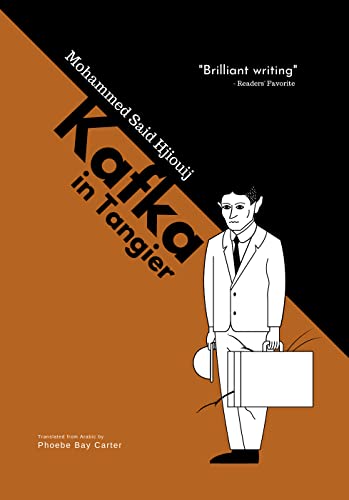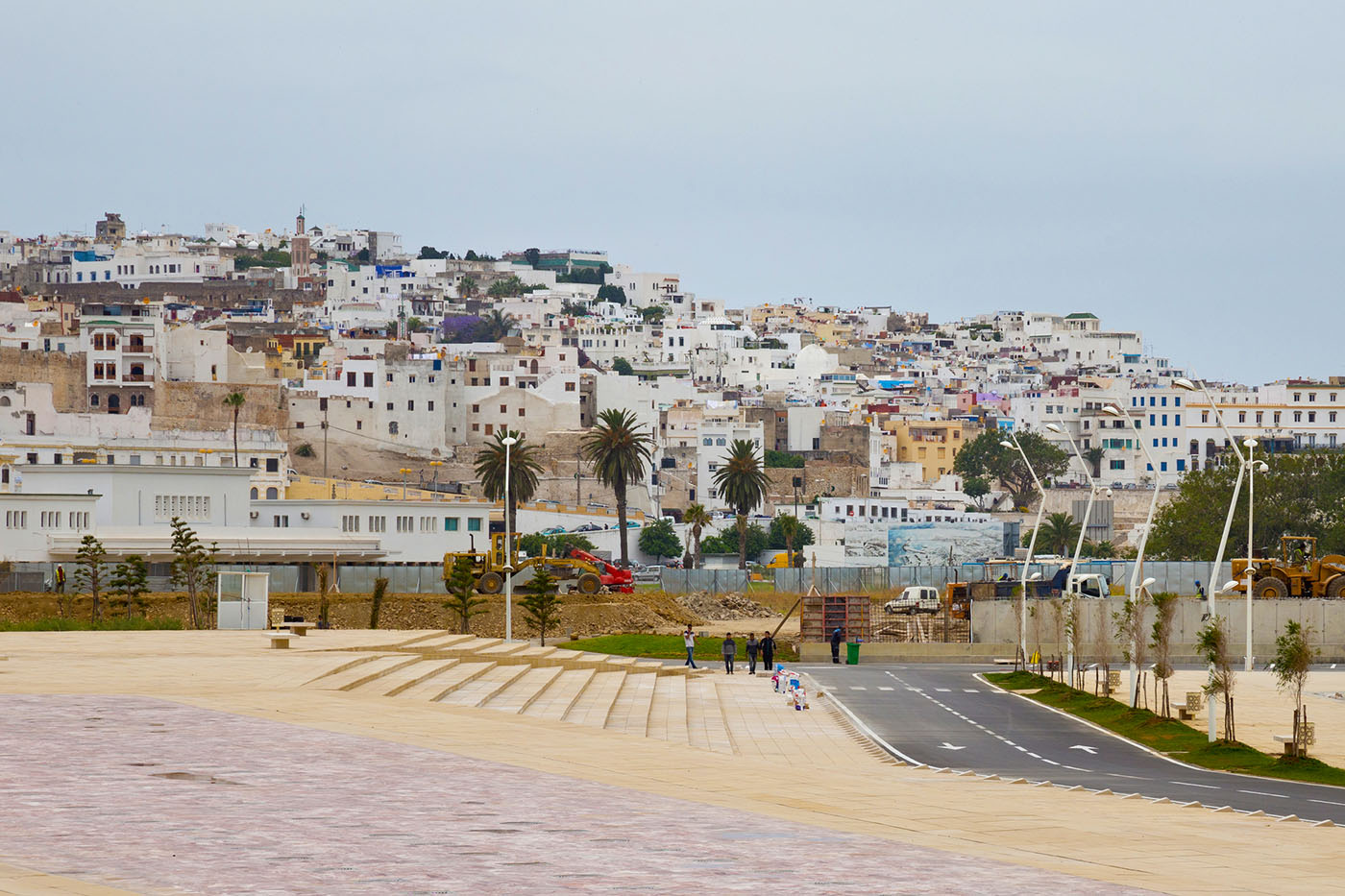Kafka in Tangier, a novella by Mohammed Said Hjiouij
Translated from the Arabic by Phoebe Bay Carter
Agora Publishing 2023
ISBN 9789920570282
Rula Khateeb Jarallah
Kafka once said, “we find freedom through failure.”
One of the first things that springs to mind when we think of Franz Kafka is his famous novella Metamorphosis. Translated from the Arabic into idiomatic English by Phoebe Bay Carter, Kafka in Tangier by Moroccan author Mohammed Said Hjiouij is an exact parallel but for the fact that it takes place in present-day Tangier, instead of Kafka’s 1915 Prague. However, Hjiouj warns, “There is no denying that the tale I am telling you […] shares a certain resemblance with the story it inspired, the one written by Franz Kafka over a century ago. That said, it is most certainly not an exact copy.”
Still, both novellas explore the theme of existentialism, which is a philosophical inquiry into the nature of human beings and their feelings of alienation, anxiety, and despair.

Here, Hjiouj’s protagonist, Jawad, wakes up one morning to find himself transformed into a small hairy monkey for no apparent reason — at least not at first. Jawad soon realizes that this unexplained transformation is irreversible. Thus, he finds himself isolated and stuck in a nightmarish situation over which he has absolutely no control and no means of resolving.
With such bizarre circumstances unfolding, the reader is sucked into a web of suspense. By alternating between past and present events in Jawad’s life, we witness the unraveling of a seemingly ordinary family. Though he has become what many around him consider a hideous creature, Jawad reflects his family’s ugly and dark secrets.
But, Hjiouj writes, “let us now leave the monkey to his mission, the teacher to his loss, the husband to his anger, and the brother to his betrayal,” and let us begin at the beginning. The novella introduces a young and naive Jawad, who is forced to give up his dream of becoming a literary critic and leave university to work two jobs to provide for his family. He is a teacher by day and a vegetable vendor by night. The previous breadwinner of the house, his father, abruptly stopped working after deciding that his job as a bartender was a sin, and now spends his days praying in a corner of the house instead. “The lord of the household […] suddenly discovered there was a Lord above him and promptly ceased lording over his household and turned instead to worshiping his newfound Lord,” writes Hjiouj.
Jawad’s nearly illiterate mother, Fatima, long ago dissolved into the shadows of an abusive marriage and was happy to have her life decided for her by the men in the family. Jawad sees hope only in his sister, Hind, whom he dreams of sending to university to become a writer so that he might live vicariously through her.
The first significant deviation from Kafka’s novella, other than the setting, is that the protagonist is married. The novella leads the reader to believe that Jawad was tricked into the marriage, with his wife having been pregnant with someone else’s child. She miscarried soon after they were wed. Later in their marriage, his wife gives birth to a girl with Down Syndrome.
The book opens with Jawad dreaming of a distorted version of an actual event that took place a few days earlier — giving the reader a clue as to what triggered the metamorphosis:
He pulled an envelope out of his pocket and on its corner was a green insignia of a snake swallowing its tail accompanied by the words Medical and Reproductive Testing Laboratory […] The envelope slipped from his grasp and he watched as the breeze tossed it about for a moment as though rocking a feather to sleep, before laying it to rest on the water’s surface. He watched as it floated, drifting with the current until it soaked up the waste water and was dragged by excrement.
At this moment, Jawad is forced to face reality. The fragile fabric that held his meaningless life together is violently torn apart, cruelly setting off a profound self-examination and revealing his true self and that of his family. When his family members learn of his transformation, their view of him shifts: previously their provider and carer, he is now a useless parasite and a burden to be rid of.
Hjiouij presents the reader with two Jawads: the old conscious Jawad, who is aware he is trapped in a creature’s body that is totally alien to him, but who is unable to speak and a prisoner of his memories; and Jawad the monkey, whose body acts without the knowledge of his conscious mind, confronting his struggles and facing up to his realities, especially when every member of his family fails to acknowledge their culpability.
As the weeks pass with Jawad stuck in his simian body, the family turns on him. He sees no shame in his father’s eyes, only hatred. He sees no empathy in his sister’s eyes, only greed and selfishness. His mother becomes convinced he is “cursed” after her attempts to heal him through rituals and amulets fail. And his wife uses his metamorphosis as the perfect excuse to leave him.
Another major deviation from Kafka’s Metamorphosis is the nature of the protagonist’s struggle. In Kafka in Tangier, Jawad is not a passive Gregor Samsa who turns into an insect at risk of being easily squashed or maimed, but a vengeful monster. The humiliation and demeaning experiences that befall him become a tool to confront the meaning of his existence. Jawad creates his own essence and embraces a self-affirming outlook.
The monkey began to slip down the window of the building to the street, intent on a mission of which our hero will know nothing, except that when he wakes up he will find his hands stained with blood and he won’t know how it got there.
The reader gets an indicator of this earlier in the story, when Hijouji writes: “Once upon a time there was, or there wasn’t a kind-hearted individual named Jawad.”
Jawad finds release and freedom in vengeance: “[D]espite the cloud of mystery hanging about him, he is sometimes filled with a feeling of blissful calm. He begins to feel a new kind of freedom. This newfound freedom from any responsibility to his family leaves him as light as a butterfly in springtime.”
The structure of the novella is a narration by every member of the family, through which they reveal their lives and secrets — past and present. Hjiouij makes good use of this Kafkaesque technique in revealing the alienation and disconnection of people. Life is a meaningless circle where seeking answers is like having a hamster running in a wheel.
The last part of the novella is a diary by Hind, who initially feels sorry for her brother. However, losing his financial support forces her to give up studying, just as he once did. As a result, Hind has to work and earn money. She begins to resent Jawad, joins the family in wishing to get rid of him, and plots her escape from a closed and confining society. Hind’s monologue and self-justification of her actions are based on her reading of Kafka’s Metamorphosis. She identifies with Samsa’s sister and uses the book as a template for her behavior and newfound mission.
Hind reflects, “I couldn’t stop thinking about Kafka’s strange story and how much like my family’s story it is.” Hind’s final betrayal of Jawad occurs when she sides with a Frenchman renting a room in their home who tries to assault her, against Jawad, who protects her but scares the man off. At this point, she believes she no longer needs this useless creature, and that the foreigner is her ticket out of her family and country.
Though the two books’ plots are related, Kafka in Tangier charts a different, less claustrophobic path than Metamorphosis. The writer includes an element of popular culture in this novella, with the protagonist roaming the bold, brash, and buzzing streets of Tangier, treating the reader to a more vibrant background.
Kafka in Tangier contains political references and the everyday life of the city’s inhabitants spiced with glimpses of daily behavior in a traditionally restricted religious society. Of course, the two novellas differ in the nature of the protagonists’ transformations and their consequences. Hjiouij’s monster can travel easily, whereas Samsa is transformed into a beetle and confined to his family’s apartment.
Alternate realities have been a focal point for many writers to seek answers to existential questions. Contemporary writers, including Kazuo Ishiguro and Haruki Murakami, have explored the relationship between dreams and reality, the threat of fate, and the influence of subconsciousness. Their novellas provide more original storylines than Hjiouij’s. Yet Hjiouij’s narrative flows well and is engaging. While it does not deviate much from Kafka’s original in terms of theme, small but significant changes set it apart. At the same time, however, Kafka in Tangier is a Kafkaesque novella, one with a gloomy individual oppressed by bureaucracy and authority, alienated and stripped of any power to influence the things that matter.
“You can choose to be free, but it’s the last decision you’ll ever make.” — Franz Kafka





Estimada Rula,
Gracias por el review 🙂 Me gustaría aclarar que el traductor de la versión del inglés (de Phoebe Bay Carter) al español soy yo (Billy Henry Muñoz), de hecho, aparece mi nombre en la portada. En segundo lugar, creo que la versión que actualmente se encuentra online no es la final. Voy a ponerme en contacto con Mohammed para preguntarle si ya se encuentra disponible la versión final de la novela.
Saludos cordiales,
Billy H.